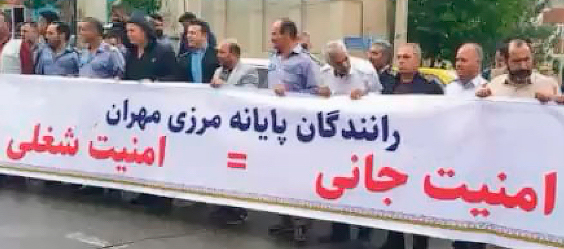While the reactionary bourgeois-clerical regime in Iran has tried to mount large demonstrations in solidarity with Hamas since its Oct. 7 pogrom against Jews in Israel — a massacre planned and carried out in close collaboration with Tehran — turnout has been markedly small.
That’s because large numbers of working people in Iran oppose the regime and its trampling of democratic, political and union rights; its persecution of religious minorities; its discrimination against Baluch, Arabs, Kurds and other oppressed nationalities; and its violent attacks on women who violate the rulers’ reactionary dress code. They know that Hamas is cut from the same cloth.
Over recent weeks, Tehran has stepped up its attempts to force women to wear “proper” hijab, issuing fines and worse. Videos show morality police thugs forcing women into police vehicles for refusing to cover up their hair. But a video from the Tehran subway shows a crowd yelling “shame on you,” forcing cops to back off from a woman they had targeted.
The regime has also stepped up the use of the death penalty. These repressive measures are aimed at intimidating working people and other opponents of the government’s expansionary war moves.
In the two weeks prior to May 2 there was an execution on average every five hours, the Iran Human Rights Organization reported.
An April 24 statement by over 80 current and former political and union prisoners opposing the executions noted they come as the “government continues to play the war drum.”
The same day, popular rapper Toomaj Salehi was sentenced to death, convicted of “corruption on earth,” “inciting a riot” and other charges. His crimes? Songs supporting the mass protests following the death of Zhina Amini after her arrest by the morality police in September 2022 and others describing the government’s disdain for working people and oppressed minorities.
Unions of teachers, sugar cane workers, as well as retiree organizations and student groups, have denounced the death sentence.
Unionists: ‘No to death penalty’
At weekly pension protests across the country April 28, some retirees demanded Salehi and other political prisoners be released. In the city of Arak they chanted, “Forget about the hijab! Pay attention to our conditions!”
A truckers’ strike began April 20 protesting fuel shortages, low hauling rates and the high cost of spare parts. Work stoppages have spread to Fars, Ilam, Yazd, East Azerbaijan, Gilan, Kerman, Sistan-Baluchistan and Tehran provinces.
Over the last month and a half “the price of beans has increased by 30%, red meat by 25%, vegetables by 50%, rice by 10%,” the Union of Truckers and Drivers said in calling the strike. “Do you expect us drivers to work the same fare as before?”
Working people and oppressed nationalities in Iran are the biggest obstacle to the Iranian rulers’ promotion of Jew-hatred and long-term determination to destroy Israel.
Now even those lauded by the regime as heroes of the Islamic Republic are speaking out. Some 460 veterans of the war with Iraq and their family members signed a statement May 2 saying that after sacrificing “to defend our homeland against foreign invasion, we now see many of our long-standing hopes and aspirations disappearing into thin air.” They called the death sentence for Salehi “shameful,” adding the government should “desist from threatening and intimidating” youth and women.
Shifting alliances, rivalries
The Iranian rulers hoped their April 13 missile and drone attack on Israel, its first ever directly from Iranian soil, would convince regimes in the region that they should back off “normalizing” relations with Israel.
Instead, the attack, which caused little damage in Israel, strengthened the view of rival governments that Tehran is a dangerous threat, and Israel is a potential ally. And it increased opposition among working people and oppressed minorities in Iran.
Sunni-based bourgeois regimes in Muslim nations like Saudi Arabia have long feared the Shiite-based Islamic Republic’s attempts to extend its counterrevolutionary influence throughout the region. Tehran presents itself as the defender of “oppressed” Shiites, who are a minority in most Muslim countries. Iran, Iraq, Bahrain and Azerbaijan are majority Shiite.
Iran’s “axis of resistance” against Israel includes Shiite Hezbollah in Lebanon, Houthis in Yemen, militias in Syria and Iraq, the Sunni-based Hamas and the government of Syria.
However, despite the crucial support Tehran — and Moscow — provided that allowed the Bashar al-Assad regime to crush a 2011 rebellion and civil war that nearly toppled his rule in Syria, “since Oct. 7 Assad has largely sat out the Gaza conflict,” Asharq Al-Awsat reported.
While Moscow buys drones from Tehran to attack Ukraine and sells some of its military equipment to the Iranian regime, its main concern in the region is defending its own economic and political interests.
According to Iranian news site Asr Iran, during a phone call with Russian President Vladimir Putin, Iranian President Ebrahim Raisi complained about Moscow’s refusal to use its antiaircraft guns in Syria to prevent Israeli attacks on Iranian positions there. Putin replied that Moscow had no intention of taking actions that would “lead to further escalation.”
Despite reestablishing relations with Tehran last year, the Saudi monarchy now says it wants to normalize relations with Israel.


